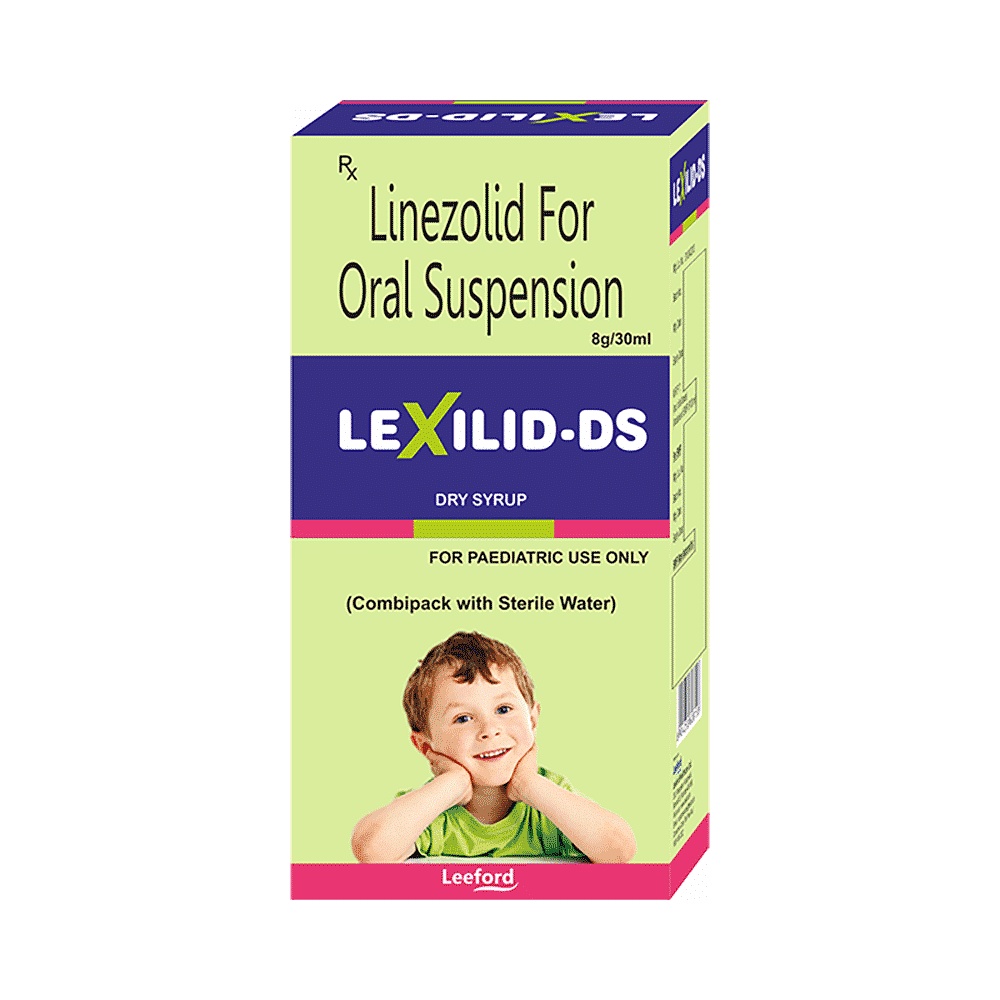
Linezomentin Dry Syrup 100mg
Manufacturer
Skg Internationals
Salt Composition
Linezolid (100mg/5ml)
Key Information
Short Description
Linezomentin Dry Syrup 100mg is an antibiotic medicine used to treat a wide range of serious infections caused by resistant bacteria.
Dosage Form
Dry Syrup
Introduction
Linezomentin Dry Syrup 100mg is an antibiotic medicine. It helps cure a wide range of serious infections caused by resistant bacteria. These may include infections affecting the skin, soft tissues, bones, brain, heart, urinary tract, lungs, and blood. It also aids in the treatment of resistant tubercular infections.
Directions for Use
Your child must drink plenty of water if he/she develops diarrhea as a side effect. Discontinue Linezomentin Dry Syrup 100mg and inform the doctor immediately if your child develops a rash, itchy skin, swelling of face and mouth, or difficulty in breathing.
How it works
Linezomentin Dry Syrup 100mg is an antibiotic. It stops bacterial growth by preventing the synthesis of essential proteins required by bacteria to carry out vital functions.
Quick Tips
Your child must complete the entire course of antibiotics. Stopping too soon may cause the bacteria to multiply again or cause another infection. Your child must drink plenty of water if he/she develops diarrhea as a side effect. Discontinue Linezomentin Dry Syrup 100mg and inform the doctor immediately if your child develops a rash, itchy skin, swelling of face and mouth, or difficulty in breathing. Only give Linezomentin Dry Syrup 100mg to your child for their current infection. Never save medicine for future illnesses.
Related Medicines

Rapidline 100mg Dry Syrup

Lienon 100mg Dry Syrup

Lyzo 100mg/5ml Dry Syrup

Linotrik 100mg Dry Syrup

Linetic Dry Syrup

Linzer 100mg Dry Syrup

Lenzomore Dry Syrup

Linzovil 100mg/5ml Dry Syrup

Lexilid DS Dry Syrup

Linzorel Dry Syrup
Frequently asked questions
What if I accidentally give my child too much Linezomentin Dry Syrup 100mg?
Overdosing on Linezomentin Dry Syrup 100mg can lead to undesirable side effects, such as low blood cell count, nerve damage, or even vision loss. It might even result in a life-threatening complication called lactic acidosis, which presents with symptoms like abdominal pain, nausea, vomiting, and general weakness. Seek immediate medical attention from your child's doctor if you notice any of these symptoms.
Can Linezomentin Dry Syrup 100mg be combined with my child's existing antidepressant medication?
No, it's not recommended to combine Linezomentin Dry Syrup 100mg with existing antidepressants. Doing so may trigger a serious condition known as serotonin syndrome, which can cause hypertension, increased heart rate, shaking, seizures, and elevated body temperature. Contact your child’s doctor immediately if you notice any of these symptoms.
What should I do if Linezomentin Dry Syrup 100mg doesn't show any improvement after the prescribed duration?
If Linezomentin Dry Syrup 100mg does not yield significant improvement despite the prescribed duration, it might be necessary to switch to a more potent antibiotic. Your child’s doctor will evaluate the situation and prescribe an alternative medication that is effective in combating the bacterial infection. In some cases, intravenous administration of antibiotics may be required, requiring a visit to your child's doctor for the procedure.
Can Linezomentin Dry Syrup 100mg be taken for an extended period?
Prolonged use of Linezomentin Dry Syrup 100mg could increase the risk of fungal or bacterial superinfection, including serious gastrointestinal infections caused by disrupting beneficial gut bacteria. Consult your child's doctor as soon as possible.
Is it safe to combine other medications with Linezomentin Dry Syrup 100mg?
Combining Linezomentin Dry Syrup 100mg with other medications may interact, leading to potential complications. Always inform your child's doctor about all the medicines they are currently taking before starting Linezomentin Dry Syrup 100mg. Additionally, check with your child’s doctor about any new medication use.
What lab tests need to be performed during treatment with Linezomentin Dry Syrup 100mg?
For children receiving Linezomentin Dry Syrup 100mg for a longer duration, blood count checks (complete blood count), basic metabolic panel, liver function test results, and routine eye and nerve function assessments may be required by the doctor.
What medical conditions should I avoid when using Linezomentin Dry Syrup 100mg in my child?
It is advisable to avoid Linezomentin Dry Syrup 100mg if your child is suffering from diabetes mellitus, hypertension, hyperthyroidism, or seizure disorders. Before administering Linezomentin Dry Syrup 100mg, it's crucial to share your child's complete medical history with their doctor.
What foods should my child avoid when taking Linezomentin Dry Syrup 100mg?
It is important for your child to avoid high tyramine food items, like old cheese, red meat, fava beans, and soy sauce. Before giving them any food, always check its freshness as it’s a critical concern.
Can I give my child vaccinations while taking Linezomentin Dry Syrup 100mg?
It's generally recommended to avoid getting your child vaccinated while they are on treatment with Linezomentin Dry Syrup 100mg. Allow the child to recover from the ongoing illness and finish the course of the medicine as prescribed by their doctor. Once the child feels better, even if they're on antibiotics, the vaccine can be given safely.


